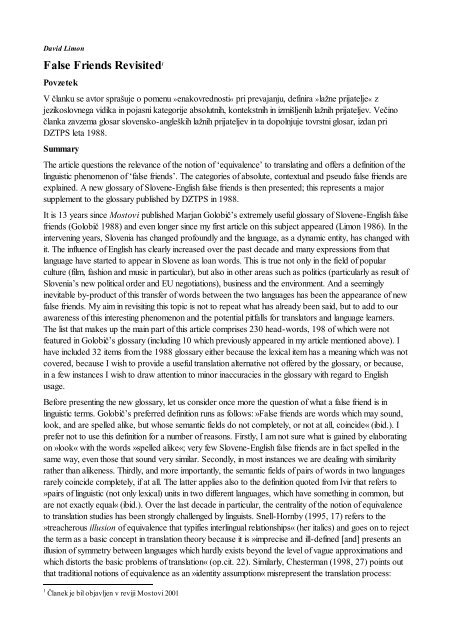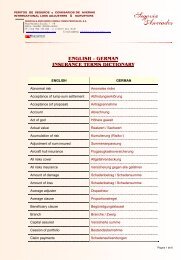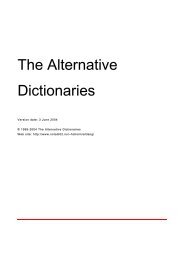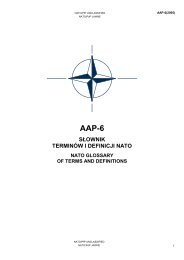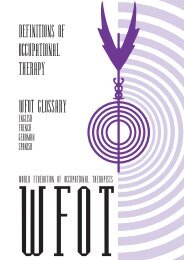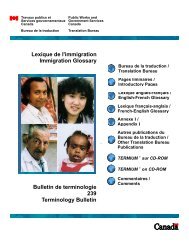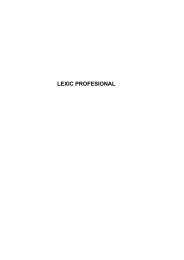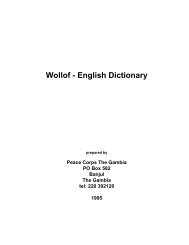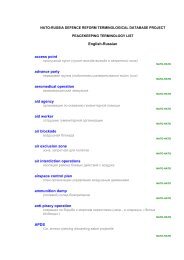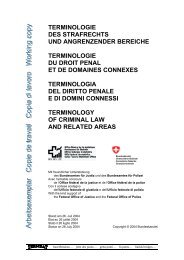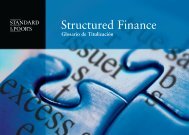False Friends Revisited1 - Lexicool
False Friends Revisited1 - Lexicool
False Friends Revisited1 - Lexicool
Create successful ePaper yourself
Turn your PDF publications into a flip-book with our unique Google optimized e-Paper software.
David Limon<br />
<strong>False</strong> <strong>Friends</strong> Revisited 1<br />
Povzetek<br />
V članku se avtor sprašuje o pomenu »enakovrednosti« pri prevajanju, definira »lažne prijatelje« z<br />
jezikoslovnega vidika in pojasni kategorije absolutnih, kontekstnih in izmišljenih lažnih prijateljev. Večino<br />
članka zavzema glosar slovensko-angleških lažnih prijateljev in ta dopolnjuje tovrstni glosar, izdan pri<br />
DZTPS leta 1988.<br />
Summary<br />
The article questions the relevance of the notion of ‘equivalence’ to translating and offers a definition of the<br />
linguistic phenomenon of ‘false friends’. The categories of absolute, contextual and pseudo false friends are<br />
explained. A new glossary of Slovene-English false friends is then presented; this represents a major<br />
supplement to the glossary published by DZTPS in 1988.<br />
It is 13 years since Mostovi published Marjan Golobič’s extremely useful glossary of Slovene-English false<br />
friends (Golobič 1988) and even longer since my first article on this subject appeared (Limon 1986). In the<br />
intervening years, Slovenia has changed profoundly and the language, as a dynamic entity, has changed with<br />
it. The influence of English has clearly increased over the past decade and many expressions from that<br />
language have started to appear in Slovene as loan words. This is true not only in the field of popular<br />
culture (film, fashion and music in particular), but also in other areas such as politics (particularly as result of<br />
Slovenia’s new political order and EU negotiations), business and the environment. And a seemingly<br />
inevitable by-product of this transfer of words between the two languages has been the appearance of new<br />
false friends. My aim in revisiting this topic is not to repeat what has already been said, but to add to our<br />
awareness of this interesting phenomenon and the potential pitfalls for translators and language learners.<br />
The list that makes up the main part of this article comprises 230 head-words, 198 of which were not<br />
featured in Golobič’s glossary (including 10 which previously appeared in my article mentioned above). I<br />
have included 32 items from the 1988 glossary either because the lexical item has a meaning which was not<br />
covered, because I wish to provide a useful translation alternative not offered by the glossary, or because,<br />
in a few instances I wish to draw attention to minor inaccuracies in the glossary with regard to English<br />
usage.<br />
Before presenting the new glossary, let us consider once more the question of what a false friend is in<br />
linguistic terms. Golobič’s preferred definition runs as follows: »<strong>False</strong> friends are words which may sound,<br />
look, and are spelled alike, but whose semantic fields do not completely, or not at all, coincide« (ibid.). I<br />
prefer not to use this definition for a number of reasons. Firstly, I am not sure what is gained by elaborating<br />
on »look« with the words »spelled alike«; very few Slovene-English false friends are in fact spelled in the<br />
same way, even those that sound very similar. Secondly, in most instances we are dealing with similarity<br />
rather than alikeness. Thirdly, and more importantly, the semantic fields of pairs of words in two languages<br />
rarely coincide completely, if at all. The latter applies also to the definition quoted from Ivir that refers to<br />
»pairs of linguistic (not only lexical) units in two different languages, which have something in common, but<br />
are not exactly equal« (ibid.). Over the last decade in particular, the centrality of the notion of equivalence<br />
to translation studies has been strongly challenged by linguists. Snell-Hornby (1995, 17) refers to the<br />
»treacherous illusion of equivalence that typifies interlingual relationships« (her italics) and goes on to reject<br />
the term as a basic concept in translation theory because it is »imprecise and ill-defined [and] presents an<br />
illusion of symmetry between languages which hardly exists beyond the level of vague approximations and<br />
which distorts the basic problems of translation« (op.cit. 22). Similarly, Chesterman (1998, 27) points out<br />
that traditional notions of equivalence as an »identity assumption« misrepresent the translation process:<br />
1 Članek je bil objavljen v reviji Mostovi 2001
»The relation of relevant similarity between source and target text is not given in advance, but takes shape<br />
within the mind of the translator under a number of constraints, the most important of which is the purpose<br />
of the translated text and the translating act«. He sees the proper subject of contrastive studies of two<br />
languages as being similarity rather than identity, as the former term takes into account what is often now<br />
referred to as the ‘fuzziness’ of language. Thus I prefer to return to the definition of the problem I used in<br />
my original article: »the mis-translation of lexical items ... which sound and/or look as if they should be<br />
equivalent in this particular context (or even, in some cases, in all contexts), but which in fact are not«<br />
(italics added). The key element here from the translator’s point of view is deception – the items may seem<br />
to be similar on the surface (a ‘friend’ to the translator), but can not be used in the same context (hence<br />
‘false friend’).<br />
Golobič’s categorisation of false friends is a helpful one. Some false friends are absolute: they are false in<br />
every context (examples include dres, fen, reklamacija and šef); but most are contextual: they are false<br />
in some contexts, not in others. The other main category is pseudo false friends, in which the English<br />
expression does not exist as a single term, only as two or more separate English morphemes (examples<br />
include avtomat, avtostop, grafoskop, hazarder, internacija, klientelizem, rekonvalescent and<br />
referat). Of course, where contextual false friends are involved, the translator has to make a pragmatic<br />
choice, based on the text type and immediate context; the notes provided in the glossary should make this<br />
selection easier.<br />
Finally, a note on EU English (sometimes referred to critically as ‘Eurospeak’). Texts and glossaries<br />
generated by the EU bureaucracy often create new English expressions and terminology (frequently under<br />
the influence of French) and may even prefer new coinages to long-established terms. Examples from the<br />
EUROVOC project quoted below are ‘cinematographic industry/production’ (instead of ‘film<br />
industry/production’) and ‘concentrated milk’ (instead of ‘condensed milk’). In such cases, it is clearly up<br />
to the translator to decide whether a particular text calls for the usual expression or the EU term.<br />
Notes on the new glossary<br />
The Slovene word is given first (in bold), followed immediately, if applicable, by any specific collocation or<br />
phrase (in italics), then an English translation is provided, with comments or examples where required. The<br />
meaning of the English false friend (underlined) is explained where necessary. Where two-word<br />
collocations or longer phrases are involved, the ‘false friend’ element is the one listed as the head word.<br />
All the terms featured in the glossary are based on the author’s direct observations, except for those taken<br />
from the EUROVOC document.<br />
Abbreviations used:<br />
(G) indicates that the term appeared in the 1988 glossary.<br />
(EU) indicates that the term is taken from the Tezaver EUROVOC.<br />
AmE = American English.<br />
BrE = British English.<br />
abstinenčen, abstinenčna kriza – withdrawal symptoms (e.g. from drugs).<br />
advokat (G) In BrE, in addition to the general word ‘lawyer’, there are also the more specific ‘barrister’,<br />
who represents clients in the higher courts, and ‘solicitor’, who prepares legal documents (such as wills<br />
and contracts) and cases, and represents clients in the lower courts.<br />
agresivno, agresivno ribištvo – over-fishing.<br />
2
akcija (G) – sale, special offer. The former is used when goods are being sold cheaper for a specific<br />
period, the latter where either goods or a service are being offered at a reduced price. The phrase<br />
akcijska cena is translated by ‘special offer’. The terms in the glossary (drive, effort) are used in<br />
collocations such as ‘recruitment drive’ and ‘aid effort’.<br />
aktiviran – realised, harnessed (e.g. in political contexts); aktivirane enote – mobilised forces (i.e.<br />
military).<br />
aktualen (G) – relevant (e.g. teachings or ideas). Issues and news items are usually referred to as<br />
‘topical’.<br />
akumulator (G) In BrE ‘(car) battery’ is the usual expression.<br />
andragogika – adult education. The term andragogy appears in Webster’s, though not in the Oxford<br />
English Dictionary; the suggested term is used far more frequently, even within the education profession.<br />
(See also entries on didaktik and pedagoški.)<br />
angina – tonsillitis, sore throat. The English word angina is normally associated with the painful heart<br />
condition ‘angina pectoris’. Note that the pronunciation of the ‘g’ and ‘i’ sounds is different.<br />
animator – entertainment/activities organiser (e.g. in hotel). An animator works on animated cartoons.<br />
arhivsko (G), arhivsko vino – vintage wine. The term ‘vintage’ is also used to refer to the year a wine<br />
was produced (letnik). An archive is where historical records or documents are stored; the BBC also<br />
has a famous ‘sound archive’ on tape.<br />
armaturen (G), armaturna plošča – dashboard (BrE). The standard British expression is not ‘fascia’ as<br />
indicated in the glossary.<br />
aromat – flavouring (EU); aromatizirano vino – flavoured wine (EU).<br />
avans – deposit, down payment (AmE). An advance in the financial sense can be a loan or a payment<br />
made earlier than intended: e.g. you may ask for an advance on your salary when you start a new job,<br />
or a writer may receive an advance for his/her next novel. Note that ‘deposit’ or ‘down payment’ can<br />
also be used to translate ara (e.g. when buying a flat).<br />
avto, avto šola – driving school.<br />
avtohton – indigenous (e.g. inhabitants, flora and fauna), native, original (e.g. inhabitants). The term<br />
autochthonous can be found in the dictionary but is rarely used outside scientific texts (usually on<br />
botany, zoology or geology). Slovenia’s avtohtoni narodnostni manjšini are probably best referred to<br />
as ‘national minorities’ or, specifically, ‘Italian and Hungarian national minorities’; other minority groups<br />
can be referred to as ‘ethnic minorities’ or ‘immigrant communities’.<br />
avtomat – vending machine (e.g. for snacks, drinks), slot machine; glasbeni avtomat – juke-box; bančni<br />
avtomat – cash machine, cashpoint (BrE), cash dispenser, ATM (AmE, this abbreviation is short for<br />
‘automated-teller machine’).<br />
avtor, avtor slike – painter; avtor filma – director; avtor glasbe – writer (of popular songs), composer;<br />
avtor razstave – designer, compiler; avtor fotografije – photographer. An author is someone who<br />
writes books, stories, essays or articles; it may also be used for the creator of a plan or proposal.<br />
bankomat – see avtomat.<br />
baterija – torch (BrE), flashlight (AmE). You put a battery in the torch. In scientific or engineering contexts<br />
it may also be a ‘fuel cell’ (EU).<br />
biološki, biološke vede – life sciences (EU).<br />
3
lok (G), beležni blok – memo pad, note pad; kolegij blok – spiral binder.<br />
boks (G), garažni boks – parking space, parking bay (AmE); razstavni boks – exhibition stand,<br />
exhibition space.<br />
centrala – (telephone) switchboard.<br />
cenzura – censorship, the censor’s office (usually in historical contexts). Censure is a formal word for<br />
disapproval: a committee may censure somebody or a parliament vote on a ‘censure motion’; or it may<br />
be said that a country’s brutal behaviour has attracted ‘international censure’.<br />
civilen, civilno služenje vojaškega roka – alternative service (EU). The Civil Service is made up of<br />
government departments and all those who work in them.<br />
čips (G) – (potato) crisps in BrE, (potato) chips in AmE.<br />
degradirati – deteriorate (e.g. environmental conditions). Degrade is also used in reference to the<br />
environment, depending on the context; it has the additional meaning of to decay or break down – in the<br />
phrase ‘biologically degradable’ it has positive connotations.<br />
didaktik – teacher, educator (AmE), educationalist (i.e. someone concerned with the theory of teaching or<br />
education, BrE). The adjective didactic frequently has a pejorative meaning in modern English: telling,<br />
rather than letting people find out for themselves, or »inclined to teach or lecture others too much«<br />
(although it still retains the meaning of ‘instructional’ or ‘teaching a moral lesson’). The noun didact is not<br />
in the OED, but is in Webster’s and is defined as »a didactic person; one over inclined to instruct<br />
others«. The noun didactics, a formal word, refers to the art or science of teaching and corresponds to<br />
didaktika.<br />
diletant – amateur (e.g. painter). Dilettante is only used in the negative sense of superficial or ‘dabbling’ in<br />
something, which is also present in Slovene.<br />
diskvalificiran – discredited (e.g. in politics). You can be disqualified from a race or competition, but not<br />
in the moral sense used in Slovene.<br />
dispanzer – clinic (e.g. children’s clinic, women’s clinic, maternity clinic). A dispensary is where medicines<br />
are prepared and given out in a hospital, i.e. lekarna in Slovene.<br />
dispozicija – (written) proposal (e.g. for a university dissertation), outline. The term disposition has the<br />
following main uses: tendency (e.g. he has a disposition to gamble’); outlook on life (e.g. ‘she has a very<br />
sweet disposition’); a willingness to do something (from the expression ‘disposed to’); arrangement or<br />
placing (e.g. of troops or buildings); the power to dispose of a thing, particularly funds (used mainly in<br />
legal contexts).<br />
drama – theatre (i.e. the building), play (e.g. ‘a play in five acts’, ‘a radio play’). The term drama may be<br />
used to refer to an individual theatrical work, but is more frequently used in a generic sense: thus we talk<br />
about ‘Shakespeare’s plays’ (or one of them), but ‘Shakespearian drama’. The word is not used to<br />
refer to a theatre building, whereas the meaning ‘exciting or distressing real life event’ is the same in both<br />
languages. A dramatik is more likely to be referred to as a ‘playwright’ than as a ‘dramatist’.<br />
dramatika – playwriting (e.g. ‘one of the greatest achievements of modern playwriting’), drama. The<br />
adjective dramatic is often used to describe real-life events (‘a dramatic rescue’), but may also relate to<br />
theatre (‘dramatic monologue’, ‘dramatic irony’). The noun dramatics may refer to activities connected<br />
with the theatre – in particular ‘amateur dramatics’.<br />
dres (G) – (football) strip, kit. Note that soccer players do not wear ‘uniforms’ as indicated in the<br />
glossary.<br />
4
ekološki, ekološka tržnica – organic market; ekološko gibanje – environmental group (e.g.<br />
Greenpeace), environmental movement (i.e. in general); ekološki davek – environmental tax (EU);<br />
ekološka linija – environment-friendly product (e.g. washing up liquid). Ecological is used in<br />
collocations such as ‘ecological balance’ (ekološko ravnotežje) and ‘ecological disaster’ (ekološka<br />
nesreča). Note that ‘organic farming’ is biokmetovanje (EU).<br />
ekonom – pressure cooker (i.e. in the kitchen).<br />
eksistenca – living (e.g. ‘He had to struggle / fight hard to make a living’), livelihood (e.g. ‘The economic<br />
recession cost him his livelihood’), life (e.g. ‘She was then able to live a true artist’s life’). The term<br />
existence has a narrower range of uses, the concept of ‘being’ the most common one; but it is also used<br />
to refer to a life lived under difficult conditions: ‘In Victorian times, the poor in a miserable existence’ or<br />
‘The workers were fighting for a better existence’.<br />
elektrarna – power station, power plant (Am/EU); jedrska elektrarna – nuclear power station (BrE) /<br />
plant (AmE); hidroelektrarna – hydo-electric power station.<br />
element – unit (e.g. kitchen, living room).<br />
emisija – issuing (i.e. of a currency). An emission is a release of gas or radiation into the atmosphere.<br />
evidenca (G) – In addition to ‘record’, the terms ‘documentation’ or ‘information’ are appropriate in<br />
many contexts.<br />
fascikel – ring binder. A fascicle is defined in Webster’s as ‘a section of a book or set of books being<br />
published in instalments as separate pamphlets or volumes’.<br />
finomehanika – precision engineering (EU).<br />
fitnes (fitness), iti na fitnes – go to the gym, go for a workout; fitnes oprema – exercise equipment.<br />
Note that we do talk about fitness (or exercise) classes or say that we are working out in order to<br />
improve our fitness (kondicija).<br />
folija – transparency, OHP slide (an OHP is an overhead projector, which in Slovene is a grafoskop);<br />
pridelava pod folijo – cultivation under plastic (EU).<br />
folkloren – folk (e.g. dance, art, song). The noun folklore refers to traditional beliefs, customs and stories<br />
of a people.<br />
fonolaboratorij – language lab/laboratory.<br />
fonoteka – record library (EU).<br />
forsirati – push (i.e. give extra support and encouragement to). Most uses of the verb force involve<br />
compulsion, overcoming resistance, or the use of force; the use nearest in meaning to the Slovene term<br />
is ‘to cause (plants, fruits, etc.) to grow or mature at an increased rate by artificial means’ e.g. to force<br />
rhubarb.<br />
fotogeničen (G) Contrary to what is stated, the adjective photogenic is very commonly used in everyday<br />
English.<br />
frekvenca – attendance (e.g. at university), attendance record, signature (i.e. confirming attendance). The<br />
term frequency is not used in any formal way in connection with attendance.<br />
ful, ful dober (pogovorno) – real/really good; ful zanimiv – dead interesting (This item is included out of<br />
interest; it is unlikely to represent a translation problem.)<br />
5
gaziran (G) The most frequent way of describing gazirana voda in both written and spoken English is<br />
now ‘sparkling water’. The word ‘fizzy’ is a common. colloquial use and in EU texts the word ‘aerated’<br />
is used. Note that negazirana voda is ‘still (mineral) water’.<br />
generalka – dress rehearsal (e.g. in theatre; also used in the metaphorical sense). The Slovene term is also<br />
used to refer to a detailed relief map: in BrE this is known as an ‘Ordnance Survey map’.<br />
globalen – general, broad, overall, total. The term global is used in such collocations as ‘global warming’<br />
(segrevanje Zemlje) where the whole world is involved; it also collocates with ‘plan/idea/view’ to<br />
show that every possible aspect is being considered, but this use seems far less frequent than the<br />
Slovene term.<br />
gravitacija – gravity. This term is much more frequent in everyday use than is gravitation.<br />
habilitacija – ‘being granted / gaining an academic title’ (there is no short expression for this). Habilitation<br />
has the sense of to make fit for a purpose, but is used very infrequently, unlike ‘rehabilitation’, which is<br />
the process by which someone who has been ill, in prison, or suffering from addiction is prepared for a<br />
normal life, or in which someone’s good name (e.g. in politics) is restored.<br />
hazarder – risk-taker. The noun hazard means ‘danger’ (a common collocation is ‘fire hazard’) and the<br />
verb means either ‘to put someone or something in a dangerous situation’ or ‘to guess’ (a common<br />
phrase is ‘hazard a guess’).<br />
indeks – (student) record book, registration book. Note that these documents are not used in the British<br />
education system, so these translations are suggestions.<br />
infarkt (G), prometni infarkt – (traffic) gridlock.<br />
informatika – information technology / IT (e.g. IT manager/director, IT course, the IT industry);<br />
informatika v medicini – medical computing (EU). According to the OED, the term informatics<br />
entered English only in 1967 as a translation of the Russian ‘informatika’; ‘information technology’,<br />
frequently shortened to ‘IT’, is the usual term for the theory and practice of using computers to store<br />
and process information.<br />
informativen – provisional (e.g. dates, arrangements, information), for information only; informativni dan<br />
– open day (which can also be dan odprtih vrat); informativna cena – guide price. The adjective<br />
informative means ‘providing useful information’.<br />
inskripcija – registration (e.g. at university), signature (i.e. confirming a student has begun to attend<br />
lectures). An inscription is either a piece of text carved on stone or in metal (e.g. on a gravestone or a<br />
monument, a coin or a medal), or it is a hand-written message on a photograph or at the front of a<br />
book.<br />
inteligenca – the intellectual class, the intelligentsia, intellectual circles. Intelligence refers only to the<br />
abstract quality.<br />
intenzivno, intenzivno degradirati – seriously deteriorate; intenzivno sodelovati – play an active part in<br />
(e.g. at a conference – to give a paper perhaps?).<br />
internacija – internment, detention; poslati v internacijo – intern, place in detention, detain (without trial).<br />
Note that we refer to an ‘internment camp’, but to a ‘detention centre’; those involved are referred to as<br />
‘internees’ or ‘detainees’.<br />
internatski, internatska šola – boarding school (EU).<br />
6
intriganten – conspiratorial (e.g. the plot of a film or a story), complex. If you say something is intriguing it<br />
means it arouses your interest and curiosity. The noun intrigue, however, is used to refer to ‘the making<br />
of secret plans to harm or deceive others’, as in such collocations as ‘political intrigue’.<br />
invalid (G) The term ‘handicapped’ is widely rejected now because of its negative connotations (with<br />
begging) and invalidi in general are now referred to as ‘the disabled’. Moreover, an invalid is not<br />
necessarily someone who is disabled: the term can also refer to someone who is bed-ridden and in need<br />
of care, or simply someone who is not able to work, because of illness.<br />
investicijski, investicijske dobrine – capital goods (i.e. machines and tools used in the production of<br />
other goods, EU).<br />
juta – sacking, sackcloth (i.e. the rough material used for making sacks etc; also referred to more<br />
technically as ‘burlap’ or ‘gunny’). Jute refers only to the plant from which the fibre for the cloth comes.<br />
kabina – booth (e.g. interpreter’s), changing room (e.g. in clothes shop), (telephone) kiosk; kabina<br />
dvigala – lift. A cabin may be a small wooden dwelling, the part of the plane where passengers sit, a<br />
room on a ship, or a passenger space on a cable car.<br />
kabinet – office (e.g. at the Faculty of Arts), small room, study (e.g. in a flat); trim kabinet – exercise<br />
room, gym. The use of cabinet to describe a small room is listed as obsolete in Webster’s. Among the<br />
many uses of the word, the most common are for a piece of furniture with drawers and/or cupboards,<br />
and for a political council of senior government ministers.<br />
kader (G) The term ‘staff’ is a frequent translation, in addition to ‘personnel’. A filmski kader is a ‘shot’<br />
(i.e. a sequence of pictures; not to be confused with ‘shoot’, which is the process of filming the whole<br />
film in a studio and/or on location).<br />
kancerogen – carcinogenic (i.e. likely to cause cancer; the noun is ‘carcinogen’).<br />
kapitalski, kapitalski dobiček – investment income (EU).<br />
karikatura – cartoon (e.g. in a newspaper). A caricature is a drawing or description of a person that<br />
exaggerates their appearance; it has no particular connection with the press. The person who draws<br />
cartoons for the press is a ‘cartoonist’.<br />
karton (G), rdeči karton – red card (i.e. in football, when a player is sent off); zdravstveni karton –<br />
health record/s.<br />
kasetofon – cassette player.<br />
katastrofa – disaster (e.g. natural disaster, man-made disaster, nuclear disaster). The term catastrophe is<br />
less frequent in such contexts.<br />
klasičen – traditional, usual; klasična sredstva – traditional channels (e.g. in marketing); klasično<br />
ribištvo – traditional fishing (EU); klasičen problem pomanjkanja kadrov – the usual problem of<br />
shortage of staff. The term classical is most often used in connection with music, with ancient Greece or<br />
Rome, or with Greek or Latin; it also has the meaning of ‘traditional in style, form or content’ but this<br />
usage is less widely used than the Slovene term.<br />
klasifikacija, klasifikacija zgodovinskih spomenikov – listing of historical buildings and monuments.<br />
klientelizem – patronage (often in the collocation ‘political patronage’).<br />
klubski, klubska mizica – coffee table.<br />
koketirati – flirt (with); koketiranje – flirting, flirtation (with). The verb coquette is archaic.<br />
7
kolega (G) The meaning of this term is far wider than indicated in the glossary. Thus it may be ‘work mate’<br />
(less formal than colleague), ‘associate’ (someone you co-operate with in some way), ‘fellow<br />
participant’ (e.g. at a conference) ‘school friend/mate’, ‘college friend/mate’ or ‘fellow student’. Note<br />
that ‘chum’ (given in the glossary) would now be considered very old-fashioned.<br />
kolektor, sončni kolektor – solar panel.<br />
komanditen, komanditna družba – limited partnership (EU), special partnership.<br />
komercialen, komercialni kredit – trade credit (EU); komercialna prireditev – trade event (EU);<br />
komercialne informacije – trade information (EU). Note that in other collocations (policy, regulations,<br />
relations) ‘trade’ is trgovinski.<br />
koncentrat, paradižnikov koncentrat – tomato puree, tomato paste; izdelek iz koncentrata –<br />
reconstituted product (EU).<br />
koncept – idea, plan, approach, strategy. Concept is usually reserved for more abstract matters; Slovene<br />
politicians, for example, frequently use the word koncept, where their British counterparts would use<br />
one of the suggested terms (e.g. nova ministrica ima pravi koncept – the new minister has the right<br />
approach).<br />
konfesionalen, konfesionalna družba – non-secular state (EU). Note that a ‘secular state’ is laicistična<br />
država.<br />
konkreten (G) – specific (e.g. example). The adjective concrete is not as common as is claimed in the<br />
glossary. In contexts such as the following ‘specific’ would be used: Seveda ne gre za kakšno<br />
konkretno poroko ampak...<br />
konstruirati – design, design and build (e.g. new type of machine or device).<br />
kontrabas – double bass. The term contrabass exists but is infrequently used.<br />
kontrola (G) In a medical context, this can also be a ‘check-up’.<br />
konzervans – preservative (e.g. in food).<br />
konzerviran – preserved (e.g. food product). Note that a konzerva (G) is a ‘tin’ (BrE) or ‘can’ (AmE).<br />
kostim – suit (for women). The term costume is used when referring to what actors wear, to clothes worn<br />
during a particular historical period or in a particular country, to fancy dress and as a short form for<br />
‘swimming costume’. In colloquial English the word ‘outfit’ is used to refer to a set of women’s clothes.<br />
kriminalist – detective, police (officer). Note that the now common expression organiziran kriminal is<br />
translated by 'organised crime'.<br />
kronološki, kronološko poročilo – historical account (EU).<br />
kura, shujševalna kura – diet.<br />
kurir (G) The term courier is now widely used to refer to all those (i.e. not only those in diplomatic service)<br />
who deliver letters and packages by motorbike, bike or van (e.g. kurirska služba – courier service)<br />
and is therefore not usually a false friend.<br />
kvantum – quantity. In physics, the term quantum collocates with ‘theory’ and ‘mechanics’ (to do with the<br />
behaviour of atomic particles); a ‘quantum leap’ is a sudden increase in something.<br />
leasing (lizing) – hire purchase (BrE), buy on credit (e.g. when buying a car – dealers may offer ‘interest<br />
free’ or ‘low interest’ credit deals/arrangements). If you lease a car (as many companies do) you can<br />
use it for a fixed period of time in return for regular payments; the term does not refer to buying on<br />
8
credit terms. Note that kredit (G) if obtained from a bank is called a loan (also posojilo); you buy<br />
something ‘on credit’ at a showroom, shop or elsewhere by signing a credit agreement or by using a<br />
credit card.<br />
lektorat – course (e.g. Spanish course, taking place within a different language department).<br />
lifting – face lift. The Slovene term also seems to be used in the press to refer to other kinds of cosmetic<br />
surgery.<br />
linč – trial by media (e.g. when someone is judged and ‘found guilty’ in the press). If someone is lynched<br />
they are actually killed by a group of others, in a violent and unjust way.<br />
list – sheet (e.g. of paper, page (e.g. in a book), leaf (i.e. of a tree); Uradni list – Official Gazette, Official<br />
Journal (EU); poročni list – marriage certificate; vmesni list – divider (e.g. in ring binder – see mapa);<br />
morski list – sole; listek – note, cloakroom ticket. In idioms such as ‘turn over a new leaf’ and ‘take a<br />
leaf out of someone’s book’ the word ‘leaf’ means ‘page’; we also talk about ‘leafing’ through a book<br />
(turning the pages quickly).<br />
magnetofon – tape recorder (see kasetefon).<br />
maneken(ka) – male model, model. The word mannequin used to be used for someone who modelled<br />
clothes, but is usually restricted now to artificial models in window displays – and even there the word<br />
‘dummy’ is more common.<br />
mapa – folder; prospekt mapa – ring binder; podložna mapa – clipboard; viseča mapa – suspension<br />
file, hanging file; mapa s spiralo – spring binder; mapa z žepki – document folder.<br />
masa (G), denarna masa – money supply (EU); masa za čevapčiče – mince, mincemeat (BrE),<br />
hamburger meat (AmE). Note that ‘mincemeat’ is also used to describe the sticky chopped dried fruit<br />
mixture which is used to make mince pies at Christmas.<br />
maska – make-up (e.g. in a film).<br />
masker(ka) – make-up artist.<br />
mašina (pogovorno) – (car) engine, car, motor (BrE, colloquial). The diminutive mašinca may have the<br />
same meaning, but is also used to refer to ‘clippers’ in the hairdresser’s (as well as ‘machine gun’).<br />
maksimalen – maximum. The term maximal is rarely used (but see note on minimalen).<br />
medij – publication (i.e. when referring to one newspaper or review), platform (e.g. for expressing one’s<br />
opinions). The media are the press, TV and radio in general; the term is not used to refer to an individual<br />
entity within the media.<br />
melona – bowler (hat).<br />
mikrob – germ (e.g. in ad for throat tablets), bug (AmE, colloquial). The term microbe is used only in<br />
scientific contexts.<br />
minimalen – minimum; minimalna zaloga – minimum stock (EU). The term minimal means very small in<br />
quantity, value or degree; it used in contexts such as ‘he achieved what he could, but at minimal cost to<br />
himself’.<br />
mit – legend. The terms myth and ‘legend’ are not interchangeable: a connotation of the former in many<br />
contexts is ‘something that is not true’. Thus the phrase France Prešeren je mit would be translated<br />
'France Prešeren is a legend'; in the same way, the recent headline Drnovšek postaja mitološka<br />
politična figura would be translated using the adjective 'legendary'.<br />
9
model – mould (e.g. for a cake or dessert), shape, style (e.g. of shoe; however, we talk about a new<br />
model when referring to cars).<br />
monitor, monitor za opazovanje – monitoring device.<br />
morala – morality, ethic (e.g. a writer’s usual approach to morality). The moral of a story is what it is trying<br />
to teach us. The morale of a team or a group of people is whether they are feeling positive (‘morale is<br />
high’) or negative (‘morale is low’).<br />
motiv – theme, image. The term motif seems to be used much less frequently than its Slovene counterpart;<br />
the two alternatives offered often occur with the adjective ‘recurring’.<br />
nekvalificiran, nekvalificiran delavec – unskilled worker (EU). In English you may be unqualified for a<br />
particular position (even one you hold), but the adjective is not used generically.<br />
nepakiran, nepakirano blago – bulk product (EU).<br />
neprofitno, neprofitno stanovanje – low-rent housing, subsidised housing.<br />
nostrifikacija – recognition (i.e. of a degree or academic qualification). The term nostrification appears in<br />
the Oxford English Dictionary and under ‘nostrificate’ (which is marked as »very rare«) there is the<br />
following: »Of Austrian universities: to admit (foreign degrees) to the same status as the native ones«.<br />
novela – amendment (i.e. to an existing law), amending act. A novella could be defined as a long short<br />
story or a short novel.<br />
obdukcija – autopsy, post-mortem (pseudo false friend?).<br />
old timer – vintage car. An old timer in AmE refers to an elderly man.<br />
optik – optician. The adjective optic means ‘pertaining to the eye or sight’; the noun is rarely used but can<br />
refer to the eye or to a lens of an optical instrument.<br />
opus – body of work (e.g. a composer’s). Opus refers to an individual musical, or perhaps literary, work.<br />
ordinacija – surgery (e.g. dental surgery, doctor’s surgery, BrE), treatment room (e.g. in a health centre),<br />
office (AmE). Ordination refers to the process of becoming a member of the clergy.<br />
orientacijski – approximate (e.g. figures, price). Orientation is the process of establishing your position or<br />
situation.<br />
paket – package (holiday).<br />
paketen, paketna dostava – parcel delivery.<br />
parceliranje – dividing up of land (EU). Note that a parcela (G) is a ‘plot of land’ or ‘a lot’ (mainly AmE,<br />
as in ‘parking lot’).<br />
park – garden (e.g. next to a block of flats), fleet (e.g. of vehicles, cars, aeroplanes, ships); botanični<br />
park – botanical garden; lunapark – fairground; rekreacijski park – leisure park (EU). English park<br />
corresponds to the Slovene term in such contexts as Tivoli Park.<br />
pedagoški (G) In addition to ‘education(al)’, the translation ‘teaching’ also applies in some contexts (e.g.<br />
pedagoški poklic – teaching profession; pedagoška praksa – teaching practice).<br />
pendant – obverse, mirror image (e.g. in art or literature, when two things are in opposition to each other;<br />
another meaning, according to the SSKJ, is ‘complement to’). A pendant is an ornament on a chain you<br />
wear round your neck.<br />
permanenten, permanentno izobraževanje – lifelong learning, adult education, continuing education. The<br />
first of these is now preferred in BrE.<br />
10
perspektiva (G). In addition to ‘prospect’, the term ‘a/the future’ is appropriate in certain contexts (e.g.<br />
perspektive podjetja so velike – the company has a great future).The expression brez perspektive<br />
can be translated by ‘hopeless’.<br />
petarda – banger (BrE), firecracker (AmE). There is a term petard with this meaning, but is rarely used.<br />
The idiom ‘hoist with/by their own petard’ means that someone is harmed by the result of their own<br />
plan.<br />
pirotehnični, pirotehnična delavnica – firework manufacturer’s. Pyrotechnics is used most often in the<br />
metaphorical sense of ‘a brilliant display’ (e.g. a speech).<br />
plakat (G) As well as ‘poster’ this can also be ‘notice’ (with text only) or ‘bill’ (AmE). In colloquial<br />
Slovene, a jumbo plakat refers to ‘(advertising) hoarding’ (BrE) or ‘billboard’ (AmE). A placard is<br />
what demonstrators carry (see transparent, below).<br />
plan, veliki plan – close up (e.g. in a film); prvi plan – foreground; drugi plan – middle ground; tretji<br />
plan – background.<br />
polihistor – polymath. The term polyhistor with the same meaning is rarely used; the given term is the usual<br />
one.<br />
politoligija – political science, political theory.<br />
potencial – capability (usually plural, as in contexts such as ‘the capabilities of the armed forces’, i.e. what<br />
a person or thing is capable of). Note that potential, which is usually an uncountable noun, either implies<br />
possibility, that something may happen, as in ‘The potential for error is great’, or has a similar meaning<br />
to the noun ‘promise’: for example, ‘As an artist, she shows a lot of potential’.<br />
praksa, sodna praksa – case law (i.e. law established by judicial decisions in particular cases, EU).<br />
preservativ – condom. Preservatives are added to food or wood to prevent decay.<br />
problem – challenge (e.g. problemi sodobne arhitekture – the challenges of contemporary architecture;<br />
e.g. enega od največjih problemov sodobnega alpinizma – one of the greatest challenges of<br />
contemporary Alpinism). Is there a problem with the way problem is used in contemporary Slovene<br />
writing? A problem is either something that causes difficulties for people (the problem of unemployment)<br />
or a puzzle that has to be solved (e.g. in maths).<br />
problematika – issue (e.g. problematika invalidov – the issue of the disabled; note that ‘issue’ is also a<br />
frequent translation for vprašanje), problem. The noun problematic is used only in academic texts on<br />
sociology; the adjective is more widely used.<br />
proces, sodni proces – trial. A process in English is also, of course, postopek in Slovene. Legal<br />
‘proceedings’ are legal action taken against someone.<br />
profesor (G). In BrE someone who teaches at a university or college is called a ‘lecturer’, whilst a<br />
professor is a senior member of the teaching staff (often the head of department).<br />
program – range (e.g. of goods in a shop), selection; otroški program – range of children’s clothes/toys;<br />
kozmetični program – range of cosmetics; lesni program – range of (wooden) furniture; zamrznjen<br />
program – frozen food range; darilni program – gift selection. Note that there is a distinction in BrE<br />
between ‘program’ (for computers) and ‘programme’ (all other uses of the word), which is not made in<br />
AmE; also that (računalniški) program may be translated by ‘(computer) software’, as well as<br />
‘program’, depending on the context.<br />
projekt (G) This term seems to be used for a wide range of activities in Slovene, including historical<br />
contexts, where project would not be used: projekt Vatikanski sporazum – attempts at an agreement<br />
11
with the Vatican; projekt novega slovenskega denarja – the design/production of new Slovene<br />
money (in 1991); projekt izdajanja slovenskega časopisa in literarnih del – the publication of a<br />
Slovene newspaper and literary works (by Prešeren and Smole).<br />
propaganda – publicity material, advertising. Propaganda usually has political connotations in English; it is<br />
also used in a pejorative sense to describe bad or harmful publicity (rumours, gossip, etc.) that has been<br />
deliberately spread.<br />
prospekt – brochure (e.g. from a travel agent). The term prospectus has a similar meaning, but is used in a<br />
more limited way – mainly by universities and by companies trying to attract investors. The word<br />
prospect has the meaning ‘possibility’.<br />
protokolaren – diplomatic (e.g. statement, formalities); protokolarni objekti – state/official reception<br />
facilities. The term protocol is less frequent than its Slovene counterpart and does not occur as an<br />
adjective. It refers to a system of rules for correct behaviour (especially in diplomacy) or to a written<br />
record of an agreement (or draft agreement) between countries; in AmE it can also refer to a course of<br />
medical treatment.<br />
psihološki, psihološka priprava – mental preparations (e.g. preparing yourself for a test or interview).<br />
radiofuzija – broadcasting (EU).<br />
rampa (pogovorno) – barrier (e.g. at a railway crossing or an entrance to a camp); izstrelitvena rampa –<br />
launch facility (EU). A ramp is a sloping surface providing access, such as a ‘wheelchair ramp’. Note<br />
that the AmE ‘entrance ramp’ or ‘exit ramp’ from an ‘expressway’ are both described by ‘(motorway)<br />
slip road’ in BrE.<br />
realizacija (G), končna realizacija – fruition; the glossary also offers ‘fulfilment, execution, performance,<br />
carrying out, implementation’.<br />
reanimacija – resuscitation (i.e. the process, or the room in a health centre).<br />
referat – paper (e.g. at a conference), office (e.g. office for student affairs).<br />
referent (G) – speaker, presenter (e.g. at a conference), clerk, official (e.g. in tax office).<br />
refleksiven – reflective. The term reflexive is used when describing an immediate reaction to something; it<br />
is also used in grammar, as in ‘reflexive verb’.<br />
reformator – reformer.<br />
rektorat – Rectorship (i.e. the post), Rector’s office.<br />
rekvizit – prop (i.e. in the theatre), equipment (i.e. for a particular activity, such as skiing), device (in the<br />
metaphorical sense); zvočni rekvizit – sound prop. The term requisite meaning ‘something required for<br />
an activity’ is a rarely used formal expression.<br />
renomiran – celebrated, renowned (pseudo false friend?).<br />
replika – reply, response. The term replica refers to a copy of something, such as a statue.<br />
reprezentativen, reprezentativna hiša – political residence.<br />
repromaterial – intermediate goods (EU), producer goods (i.e. raw materials, machinery, etc. used in<br />
producing consumer goods).<br />
revizija – audit (e.g. financial audit); revizija poslovodenja – management audit (EU). Revision is an<br />
appropriate translation when referring to changing a document or agreement, although the process of<br />
12
examining it before changes are made would be referred to as a ‘review’. In BrE, ‘revision’ also refers<br />
to preparation for an examination (see študirati).<br />
revizor – auditor. The word reviser has no specific use beyond ‘someone who revises / is revising’ (i.e.<br />
amending or altering).<br />
rezervat – nature reserve, refuge (e.g. wildlife refuge); rezervat ptic – bird sanctuary. A reservation is an<br />
area of land set aside for a particular ethnic group; in the USA, these used to be called ‘Indian<br />
reservations’, but the term ‘Indian’ has now been replaced by ‘Native American’.<br />
rezerva – substitute (e.g. in a sports team); jemati z reservo – treat with caution, take with a pinch of salt;<br />
državne rezerve – buffer stock (EU).<br />
ritem, ritem pogajanja – the pace of negotiations; ritem dela – rate of work (EU).<br />
salon (G), pohištveni salon – furniture showroom; avto salon – car showroom. Note that 'showroom' is<br />
not only AmE as indicated in the glossary.<br />
sankcija, kazenska sankcija – penalty (EU).<br />
sekundarij – ward doctor (i.e. in a hospital).<br />
semafor – traffic light. A semaphore is a signalling system, usually employing flags.<br />
serijski – mass-produced (e.g. goods), manufactured (e.g. furniture); serijska izdelava – massproduction.<br />
The term serial is used in ‘serial number’, ‘television serial’ and ‘serial killer’; it does not<br />
mean (as the Slovene term does) the opposite of ‘hand made’.<br />
serviser – service engineer (e.g. for photocopier, motorbike; note that for cars the term is ‘mechanic’).<br />
The term servicer can be found in the dictionary, but is rarely used.<br />
sestra – nurse. In BrE a sister is in charge of a hospital ward – a head nurse.<br />
shema – diagram (e.g. of the human skeleton or blood circulation, sometimes referred to as a ‘schematic’),<br />
schedule or time table (e.g. of a celebratory event); programska shema (TV) – programme schedule;<br />
shema prog Mestnega potniškega prometa v Ljubljani – map of Ljubljana bus routes. The formal<br />
word schema with the meaning ‘diagram, plan, or underlying pattern’ is rarely used outside academic<br />
texts. The word scheme appears in political contexts such as ‘a scheme to combat unemployment’ and<br />
also collocates with words such as: ‘savings’, ‘pension’ and ‘money-making’.<br />
signalizacija, prometna signalizacija – traffic signs (EU). The term signalization is used in Pavlovian<br />
psychology when describing how the response to a signal can become the same as the response to the<br />
original stimulus.<br />
sistemski, sistemski zakon – organic law (EU).<br />
socialna država – welfare state (i.e. a state in which the government provides free health care and<br />
education, as well unemployment benefit, pensions, etc.). Note that the term ‘welfare’ in America refers<br />
to the money received from the state (a person is said to be ‘on welfare’); in Britain, this is usually called<br />
‘social security’.<br />
sorta – variety (e.g. of fruit); sorta trte – variety of grape.<br />
specifika – (special) characteristics (e.g. specifika našega kmetijstva – the special characteristics of our<br />
agriculture). Specific with this kind of meaning is an adjective only; the noun usually occurs in the plural<br />
form, as in the phrase ‘let’s get down to specifics’, and means ‘(relevant) details’.<br />
stimulacija – bonus (e.g. paid to employees with extra responsibility).<br />
13
stimulirati – reward (e.g. employees), promote (e.g. an action or an idea).<br />
stripar – cartoonist. (Note that strip may be translated by ‘comic strip’ in BrE.)<br />
struktura – profile (e.g. of the population, residents, students); struktura stroškov – cost breakdown.<br />
subjekt – protagonist, actor (i.e. as opposed to passive observer), player (e.g. ‘political player’); poslovni<br />
subjekt – business (entity/enterprise).<br />
super – great (also as an exclamation); super ponudba – (extra) special offer; super ugodno – special<br />
low price.<br />
suveren – independent, supreme (e.g. work of art or artist); suveren oblikovalec jezika – masterful user<br />
of the language; suveren organizator – supreme organisor. The use of sovereign to mean 'supreme' or<br />
'most notable' is obsolete; the term most frequently collocates with 'state' (country) or 'power'.<br />
suverenost, obrtniška suverenost – supreme craftsmanship.<br />
šofer – driver (e.g. of a bus or lorry (BrE) / truck (AmE)). A chauffer is employed to drive a private car or<br />
limousine; those employed to drive public officials are called ‘drivers’.<br />
študijski, študijsko leto – academic year; študijski dopust – a sabbatical (‘study leave’ is also used,<br />
though more commonly for students; teachers and academic staff usually ‘go on / take a sabbatical’),<br />
training leave (for those in employment).<br />
študirati – revise (i.e. for an exam, BrE), read (e.g. She’s reading Maths at Cambridge; formal BrE), learn<br />
(e.g. a particular topic, or a role in a play), think about (e.g. dolgo sta študirala, preden sta se<br />
odločila – they thought about it for a long time before deciding). Other frequent uses of the verb will be<br />
translated by study.<br />
taksa, uvozna taksa – import levy (EU).<br />
tarifa – (list of) charges (e.g. postal charges, telephone charges, bank charges), (list of) rates (e.g. legal<br />
rates), price list; tarifa zračnega prevoza – air freight rate (EU). A tariff is a list of duties imposed on<br />
imports or exports; it may also be used for a table of charges for transport or public services; within the<br />
EU there is a ‘support tariff’ (podporna tarifa).<br />
tehnik – technician (e.g. laboratory, computer, construction); administrativni tehnik – secretary, clerk,<br />
administrative assistant; ekonomski tehnik – clerk, financial/accounts assistant, sales<br />
person/representative; glasbeni tehnik – (studio/sound) engineer; komercialni tehnik – sales<br />
person/representative; strojni tehnik – machinist, (machine) operator, engineer (e.g. heating engineer);<br />
tekstilni tehnik – machinist, textile worker; upravni tehnik – legal secretary/clerk; zdravstveni tehnik<br />
– male nurse. (Note that a wide range of jobs are advertised under these headings and that the job titles<br />
vary accordingly.) The term technic, meaning a technique or technicality, is used in AmE but is rare; the<br />
plural noun ‘technics’, applying especially to the study of the mechanical or industrial arts, is more<br />
common.<br />
tehnika – technology (e.g. zastarela tehnika – outdated technology, e.g. najsodobnejša tehnika – the<br />
latest technology); bela tehnika – white goods (e.g. kitchen appliances, fridge, washer, cooker, etc.);<br />
elektrotehnika – electrical engineering (EU). The term technique would be used when referring to<br />
tehnika in the arts (i.e. a way of doing something or carrying out a process).<br />
televizija – television channel. Although we can translate nacionalna televizija with ‘national television’, a<br />
phrase such as na drugih televizijah can only be translated by ‘other television channels’. Other uses<br />
of the term correspond to ‘television’ or ‘TV’ (or ‘telly’ in colloquial BrE).<br />
14
tematika – theme (e.g. of a work of art or literature). Thematic is an adjective used in collocations such as<br />
‘thematic approach’.<br />
tendenca – trend (e.g. a statistical trend). A tendency is either something worrying or unpleasant that<br />
keeps happening or a part of your character that makes you behave in a particular way; it is not used<br />
when discussing figures or statistics.<br />
terenski (G), terenski studio – mobile studio (i.e. for television).<br />
termin – date, period (i.e. from… to…); zadnji termin – final date (i.e. last opportunity).<br />
termofor – hot-water bottle (pseudo false friend?).<br />
test – questionnaire (e.g. in a magazine). Test in the sense of a series of questions is used only in the<br />
classroom environment.<br />
trak – ribbon (e.g. hair ribbon, typewriter ribbon), band (e.g. hatband, headband, armband), strip (e.g. of<br />
paper, of material, protective strip), tape (cut the tape/ribbon at an official opening); lepilni/samolepilni<br />
trak – adhesive strip/tape; merilni trak – tape measure; žalni trak – black armband; izolirni trak –<br />
(electrical) insulating tape; tekoči trak – conveyor belt, production line. The main, non-idiomatic uses of<br />
track are ‘railway track’, path (e.g. ‘mountain track’), sports track (e.g. for athletics, cycling, car racing,<br />
horse racing, greyhound racing) and a song or piece of music on a CD or cassette.<br />
transparent (G) – placard (i.e. carried by someone at a demonstration), banner.<br />
trenirka – tracksuit.<br />
tribuna – stand. A tribune is a raised platform, pulpit, or seating area, particularly in a church; the term is<br />
not associated with sports stadia.<br />
trim – exercise; trim steza – exercise path, jogging path; trim kabinet – exercise room, gym. If you wish<br />
to stay trim you want to keep yourself slim and fit. The verb is commonly used in the sense of ‘cut small<br />
amounts off’: for example, you can trim someone’s hair, a hedge, or a budget.<br />
univerzalen – general (e.g. factors, effects, results). The term universal applies in all cases, to every part of<br />
the world or universe, or to a whole group or society; the Slovene term seems to be used more widely<br />
or loosely (similarly to globalen).<br />
urbanizem – town planning (EU), city planning (AmE). The term urbanism is used to refer to city life and<br />
also to planning, but the latter less frequently than the given terms. Note that in EU texts, urbanist is<br />
translated by ‘town-planning profession’ and urbanistični predpisi by ‘town-planning regulations’.<br />
uta, pasja uta – (dog) kennel. A hut (e.g. in a garden) is used by people.<br />
varirati – fluctuate (e.g. statistics, trends). The Slovene term is sometimes used in journalistic reports, such<br />
as on the state of the economy, where vary would not be used.<br />
vizitka – business card (i.e. with name, job title, contact details), greetings card (e.g. birthday card, get<br />
well card, congratulations). Visiting cards (or ‘calling cards’) were frequently used in the past among the<br />
middle and upper classes when making a social call or sending a gift.<br />
References<br />
Chesterman, Andrew (1998) Contrastive Functional Analysis. John Benjamins, Amsterdam.<br />
Collins Cobuild English Dictionary. Harper Collins, 1995.<br />
Golobič, Marjan (1988) A Glossary of English-Slovene <strong>False</strong> <strong>Friends</strong>. DZTPS, Ljubljana.<br />
15
Limon, David (1986) »<strong>False</strong> friends and Slovene-English translation«. In: Klinar, Stanko (ed.) Prispevki k<br />
tehniki prevajanja iz slovenščine v angleščino. Didakta, Radovljica. 1995, pp. 67-74.<br />
The Oxford English Dictionary, Second Edition, on Compact Disc. OUP, 1994.<br />
Slovar slovenskega knjižnega jezika. Državna založba 1991.<br />
Snell-Hornby, Mary (1995) Translation Studies: An integrated approach. John Benjamins, Amsterdam.<br />
Tezaver Eurovoc, 3. zvezek, 3. izdaja. Informacijsko-dokumentacijski center, Ljubljana, 1998.<br />
Webster’s Encyclopedic Unabridged Dictionary of the English Language. Gramercy, 1993.<br />
16


